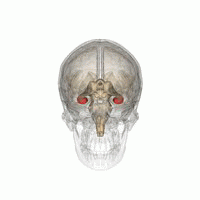Related Research Articles

Anxiety is an emotion which is characterised by an unpleasant state of inner turmoil and includes feelings of dread over anticipated events. Anxiety is different from fear in that fear is defined as the emotional response to a present threat, whereas anxiety is the anticipation of a future one. It is often accompanied by nervous behavior such as pacing back and forth, somatic complaints, and rumination.

Dementia is a syndrome associated with many neurodegenerative diseases, characterized by a general decline in cognitive abilities that affects a person's ability to perform everyday activities. This typically involves problems with memory, thinking, behavior, and motor control. Aside from memory impairment and a disruption in thought patterns, the most common symptoms of dementia include emotional problems, difficulties with language, and decreased motivation. The symptoms may be described as occurring in a continuum over several stages. Dementia ultimately has a significant effect on the individual, their caregivers, and their social relationships in general. A diagnosis of dementia requires the observation of a change from a person's usual mental functioning and a greater cognitive decline than might be caused by the normal aging process.

Anxiety disorders are a group of mental disorders characterized by significant and uncontrollable feelings of anxiety and fear such that a person's social, occupational, and personal functions are significantly impaired. Anxiety may cause physical and cognitive symptoms, such as restlessness, irritability, easy fatigue, difficulty concentrating, increased heart rate, chest pain, abdominal pain, and a variety of other symptoms that may vary based on the individual.

Exercise is physical activity that enhances or maintains fitness and overall health. It is performed for various reasons, including weight loss or maintenance, to aid growth and improve strength, develop muscles and the cardiovascular system, prevent injuries, hone athletic skills, improve health, or simply for enjoyment. Many people choose to exercise outdoors where they can congregate in groups, socialize, and improve well-being as well as mental health.

Creatine is an organic compound with the nominal formula (H2N)(HN)CN(CH3)CH2CO2H. It exists in various tautomers in solutions. Creatine is found in vertebrates, where it facilitates recycling of adenosine triphosphate (ATP), primarily in muscle and brain tissue. Recycling is achieved by converting adenosine diphosphate (ADP) back to ATP via donation of phosphate groups. Creatine also acts as a buffer.

Nootropics, colloquially brain supplements, smart drugs and cognitive enhancers, are natural, semisynthetic or synthetic compounds which purportedly improve cognitive functions, such as executive functions, attention or memory.
Neurohacking is a subclass of biohacking, focused specifically on the brain. Neurohackers seek to better themselves or others by “hacking the brain” to improve reflexes, learn faster, or treat psychological disorders. The modern neurohacking movement has been around since the 1980s. However, herbal supplements have been used to increase brain function for hundreds of years. After a brief period marked by a lack of research in the area, neurohacking started regaining interest in the early 2000s. Currently, most neurohacking is performed via do-it-yourself (DIY) methods by in-home users.

Vinpocetine is a synthetic derivative of the vinca alkaloid vincamine, differing by the removal of a hydroxyl group and by being the ethyl rather than the methyl ester of the underlying carboxylic acid. Vincamine is extracted from either the seeds of Voacanga africana or the leaves of Vinca minor.
Fast ForWord is a computer-based reading program with limited evidence of effectiveness, created by Scientific Learning Corporation. It is based on a theory about the cognitive abilities of children with language and literacy learning difficulties.
Michael Matthias Merzenich is an American neuroscientist and professor emeritus at the University of California, San Francisco. He took the sensory cortex maps developed by his predecessors and refined them using dense micro-electrode mapping techniques. Using this, he definitively showed there to be multiple somatotopic maps of the body in the postcentral sulcus, and multiple tonotopic maps of the acoustic inputs in the superior temporal plane.

Brain training is a program of regular activities purported to maintain or improve one's cognitive abilities. The phrase “cognitive ability” usually refers to components of fluid intelligence such as executive function and working memory. Cognitive training reflects a hypothesis that cognitive abilities can be maintained or improved by exercising the brain, analogous to the way physical fitness is improved by exercising the body. Cognitive training activities can take place in numerous modalities such as cardiovascular fitness training, playing online games or completing cognitive tasks in alignment with a training regimen, playing video games that require visuospatial reasoning, and engaging in novel activities such as dance, art, and music.

The psychological and physiological effects of meditation have been studied. In recent years, studies of meditation have increasingly involved the use of modern instruments, such as functional magnetic resonance imaging and electroencephalography, which are able to observe brain physiology and neural activity in living subjects, either during the act of meditation itself or before and after meditation. Correlations can thus be established between meditative practices and brain structure or function.
Mild cognitive impairment (MCI) is a neurocognitive disorder which involves cognitive impairments beyond those expected based on an individual's age and education but which are not significant enough to interfere with instrumental activities of daily living. MCI may occur as a transitional stage between normal aging and dementia, especially dementia due to Alzheimer's disease. It includes both memory and non-memory impairments. About 50 percent of people diagnosed with MCI have Alzheimer's disesae and go on to develop Alzheimer's dementia within five years. MCI can also serve as an early indicator for other types of dementia, although MCI may remain stable or even remit.
Working memory training is intended to improve a person's working memory. Working memory is a central intellectual faculty, linked to IQ, ageing, and mental health. It has been claimed that working memory training programs are effective means, both for treating specific medical conditions associated with working memory deficit, and for general increase in cognitive capacity among healthy neurotypical adults.

Cogmed is a cognitive training software program created in the lab of Torkel Klingberg, a neuroscientist at the Karolinska Institute. Torkel Klingberg was using it to present working memory challenges to people while he studied their brains using fMRI, to try to learn about neuroplasticity. When the studies appeared to show that the challenges improved working memory, Klingberg founded Cogmed in 2001, with financial backing from the Karolinska Institute and venture capitalists.

Memory improvement is the act of enhancing one's memory. Factors motivating research on improving memory include conditions such as amnesia, age-related memory loss, people’s desire to enhance their memory, and the search to determine factors that impact memory and cognition. There are different techniques to improve memory, some of which include cognitive training, psychopharmacology, diet, stress management, and exercise. Each technique can improve memory in different ways.

The neurobiological effects of physical exercise involve possible interrelated effects on brain structure, brain function, and cognition. Research in humans has demonstrated that consistent aerobic exercise may induce improvements in certain cognitive functions, neuroplasticity and behavioral plasticity; some of these long-term effects may include increased neuron growth, increased neurological activity, improved stress coping, enhanced cognitive control of behavior, improved declarative, spatial, and working memory, and structural and functional improvements in brain structures and pathways associated with cognitive control and memory. The effects of exercise on cognition may affect academic performance in children and college students, improve adult productivity, preserve cognitive function in old age, preventing or treating certain neurological disorders, and improving overall quality of life.
Lumosity is an online program consisting of games claiming to improve memory, attention, flexibility, speed of processing, and problem solving.
Cognitive behavioral training (CBTraining), sometimes referred to as structured cognitive behavioral training, (SCBT) is an organized process that uses systematic, highly-structured tasks designed to improve cognitive functions. Functions such as working memory, decision making, and attention are thought to inform whether a person defaults to an impulsive behavior or a premeditated behavior. The aim of CBTraining is to affect a person's decision-making process and cause them to choose the premeditated behavior over the impulsive behavior in their everyday life. Through scheduled trainings that may be up to a few hours long and may be weekly or daily over a specific set of time, the goal of CBTraining is to show that focusing on repetitive, increasingly difficult cognitive tasks can transfer those skills to other cognitive processes in your brain, leading to behavioral change. There has been a recent resurgence of interest in this field with the invention of new technologies and a greater understanding of cognition in general.
LearningRx is a franchise based in Colorado Springs, Colorado. The company claims to improve cognitive abilities.
References
- ↑ Dayton, Lily (June 1, 2013). "If you're thinking of trying training". Los Angeles Times . Retrieved August 6, 2016.
- ↑ Reddy, Sumathi (July 25, 2016). "Can This Brain Exercise Put Off Dementia?". The Wall Street Journal . Retrieved August 6, 2016.
- ↑ Boytchev, Hristio (February 18, 2013). "Trying to help schizophrenics with computer brain games". The Washington Post . Retrieved August 6, 2016.
- ↑ "Posit Science Corporation". Bloomberg L.P. Retrieved August 6, 2016.
- ↑ Rauber, Chris (June 2, 2011). "Posit Science changes CEOs, names Henry Mahncke chief executive". San Francisco Business Times . Retrieved August 6, 2016.
- ↑ Austin, Neil (May 24, 2016). "Brainstorm: FTC Continues Enforcement Trend Against Cognitive Function Claims". Trademark and Copyright Law.
- ↑ Howard, Jacqueline (October 20, 2016). "Do brain-training exercises really work?". CNN.
- ↑ Simons, DJ; Boot, WR; Charness, N; Gathercole, SE; Chabris, CF; Hambrick, DZ; Stine-Morrow, EA (October 2016). "Do "Brain-Training" Programs Work?". Psychological Science in the Public Interest. 17 (3): 103–86. doi:10.1177/1529100616661983. PMID 27697851. S2CID 13729927.
- ↑ Shah, TM; Weinborn, M; Verdile, G; Sohrabi, HR; Martins, RN (March 2017). "Enhancing Cognitive Functioning in Healthly[sic] Older Adults: a Systematic Review of the Clinical Significance of Commercially Available Computerized Cognitive Training in Preventing Cognitive Decline". Neuropsychology Review. 27 (1): 62–80. doi:10.1007/s11065-016-9338-9. PMID 28092015. S2CID 254856525.